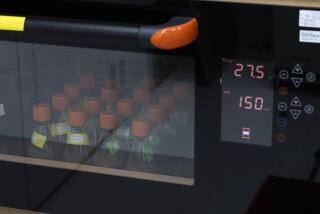Vaccine That Spurs Attack on Cancer Cells to Be Tested
- Share via
NEW YORK — An idea that has tantalized cancer researchers for decades--find an “exploitable difference” between cancer cells and normal cells and use it in therapy--may come to fruition in clinical trials beginning this week in Pittsburgh, Pa., doctors said Wednesday.
The first two patients--one with colorectal cancer, the other with breast cancer--already have received their first doses of an anti-cancer vaccine developed at the University of Pittsburgh Medical Center. Dozens of other patients will soon follow.
The vaccine is based on findings by Pittsburgh immunologist Olivera Finn that breast, colon and pancreas tumor cells carry abnormal molecules on their surfaces. By stimulating an immune attack on cells with the abnormal molecules, she hopes cancer cells will be eliminated.
The vaccine’s target, called mucin, is a long, slippery molecule found on the surfaces of ductal cells, those lining the inside of tube-like ducts in various organs. They perform a lubricating role; when released, mucin becomes a major part of the gooey fluid called mucus.
On normal, healthy cells, each mucin molecule is covered completely by sugars. But on cancer cells, mucin appears to be seminaked, with part of its protein backbone visible to the immune system. Thus abnormal, semi-naked mucin serves as a marker that identifies cancer cells.
To create the vaccine, the researchers made exact chemical copies of the semi-naked mucin molecule. This synthetic mucin is then injected into the patients, along with an immune-stimulating substance called BCG. Together, the BCG and mucin should stimulate a vigorous immune attack on cancer cells, but not against normal cells.
Unlike other anti-cancer vaccines now being tested, the Pittsburgh vaccine tries to activate the other potent arm of the immune system, cellular immunity, which uses white blood cells called killer T-cells. It is cellular immunity that rejects implanted organs, and sometimes kills off cancer cells.
Other vaccine testing is under way at USC and the John Wayne Cancer Center in Santa Monica.





